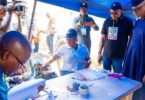Amaka Okoye, the West African Correspondent for the German news network Deutsche Welle, didn’t always envision herself as a journalist.... CLICK TO READ THE FULL NEWS HERE▶▶
Growing up, she harboured aspirations of becoming a lawyer, influenced by her assertive nature as the youngest among her siblings, always ready to argue her case.
However, her path took a turn when she discovered her innate talent for storytelling.
Reflecting on her journey, Amaka recalls how effortlessly stories flowed from her lips upon returning home from her daily adventures. She possessed a gift for vividly articulating her experiences, painting pictures with words that captivated her audience.

Recognizing this natural flair, she redirected her academic pursuits from law to mass communication, with a focus on radio broadcasting. Thus began her career,
transitioning from radio to print and eventually to television
journalism.
Despite the potential she had seen in herself as a lawyer, Amaka found true fulfilment in journalism. She admits that while she could have excelled in law, it wouldn’t have brought her the same level of happiness and satisfaction she derives from storytelling.
As the West African Correspondent for Deutsche Welle, Amaka’s role is to cover stories from across the region, delving into the heart of communities to share their narratives with the world. Her journey to this prestigious position began when she was headhunted by DW, a testament to her talent and
dedication to her craft.
When asked about the stories that have left a lasting impact on her, Amaka recounts a poignant interview she conducted with Maryam Ali-Maiyanga one of the Chibok girls who had been kidnapped in 2014.
This young woman, having endured captivity and stigma upon her return, found solace in the power of storytelling. Inspired by their encounter, she reached out to Amaka, expressing her desire to return to school to study mass
communication, determined to share their story with the world.
Another unforgettable encounter was with Ayo, a former military officer in Nigeria who faced unjust imprisonment for daring to question authority. Through Amaka’s interview, Ayo’s story gained exposure, leading to opportunities that
transformed his life, including scholarships for his children and his daughter who was about entering the university got support from someone in Canada to pay her tuition.
For Amaka, these stories epitomize the impact journalism can have, not only in shedding light on injustices but also in effecting positive change in people’s lives.
Through her work, she strives to give voice to the voiceless and shine a spotlight on the untold stories of West Africa, embodying the essence of journalism as a force for good.











